The security services industry in the US is estimated to be worth $50 billion and expected to grow steadily in the next five years. Demand forsecuri ...
You might consider targeting a niche, such as hunting rifles.
We earn commissions if you shop through the links below. Read more
Written by: Carolyn Young
Carolyn Young is a business writer who focuses on entrepreneurial concepts and the business formation. She has over 25 years of experience in business roles, and has authored several entrepreneurship textbooks.
Edited by: David Lepeska
David has been writing and learning about business, finance and globalization for a quarter-century, starting with a small New York consulting firm in the 1990s.
Published on June 25, 2023

Investment range
$44,600 - $77,500
Revenue potential
$520,000 - $780,000 p.a.
Time to build
3 – 6 months
Profit potential
$78,000 - $117,000 p.a.
Industry trend
Growing
Commitment
Full-time
Important elements to think about when starting your gun store:
Empowering Confidence: Sandi Olson on Concealed Carry Fashion
You May Also Wonder:
Is a gun store profitable?
Gun stores can be profitable businesses, with profitability depending on factors such as location, customer demand, product selection, pricing, competition, and effective management.
What happens during a typical day at a gun store?
A typical day at a gun store involves activities such as assisting customers with inquiries and purchases, conducting background checks, managing inventory, providing maintenance and repair services, offering training and education on firearm safety, and staying updated on firearm laws and regulations.
What is the growth potential of a gun store?
The growth potential of a gun store can vary based on factors such as local market demand, population demographics, competition, and industry trends. Growth opportunities can include expanding product offerings, targeting specific customer segments, establishing a strong online presence, offering specialized services or training, and staying current with market trends.
What type of business is a gun store?
A gun store is primarily a retail business specializing in the sale of firearms, ammunition, and related accessories. It operates within the firearms industry and serves individuals interested in purchasing firearms for personal protection, sport shooting, hunting, or collecting purposes. Gun stores must comply with federal, state, and local laws and regulations regarding firearm sales and distribution.
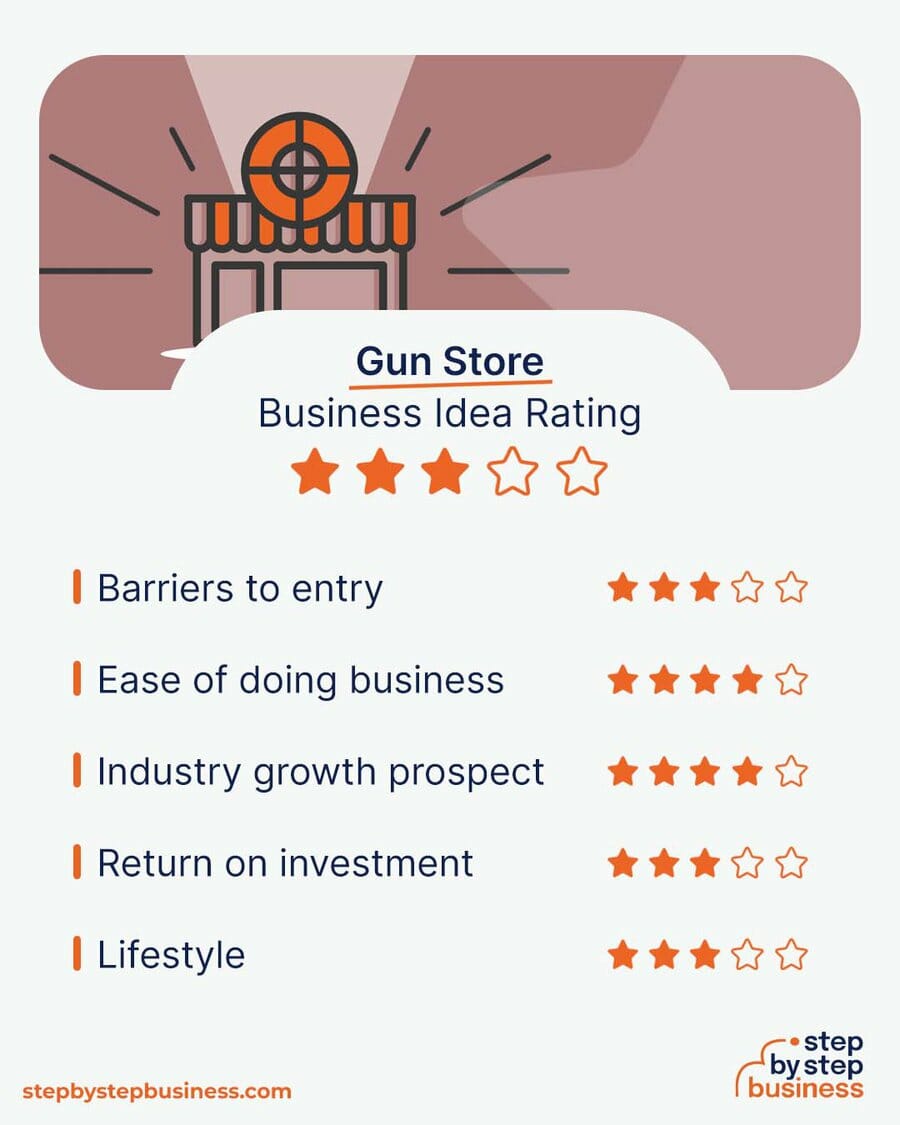

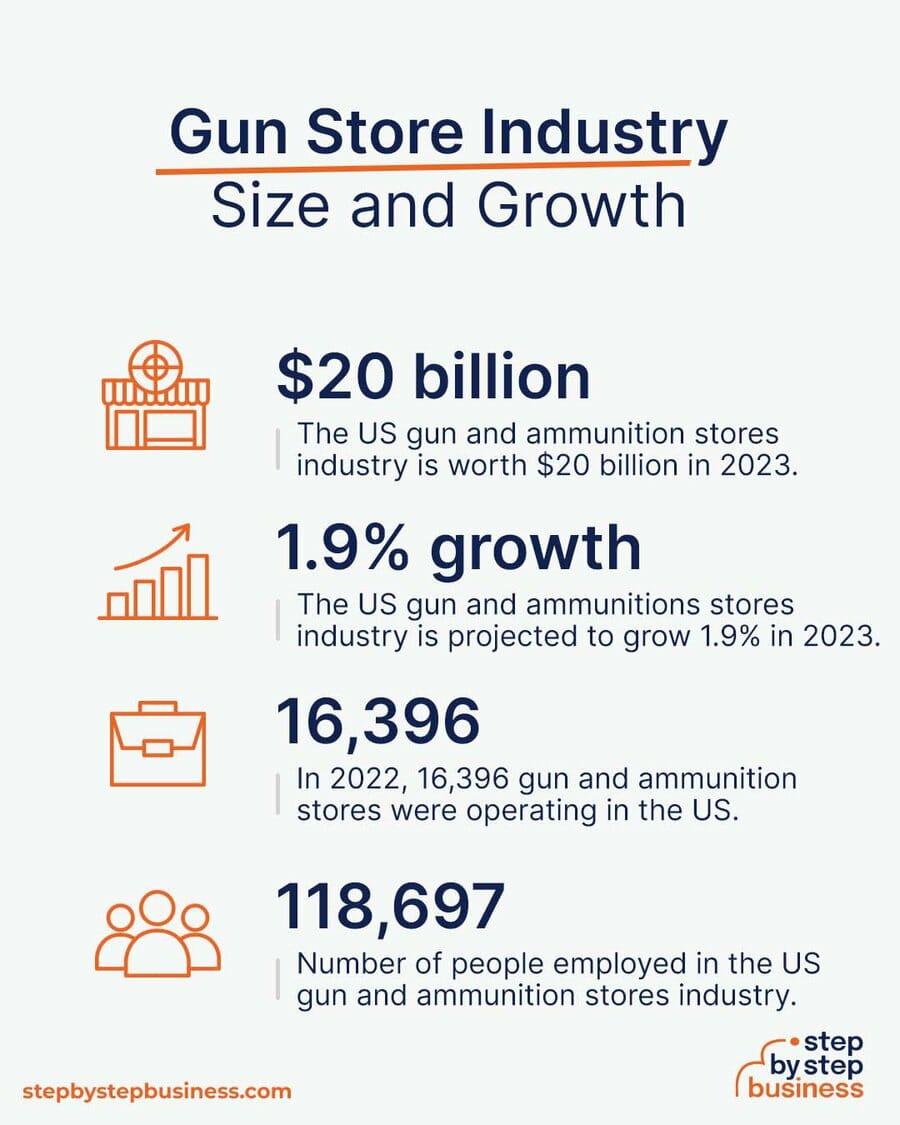
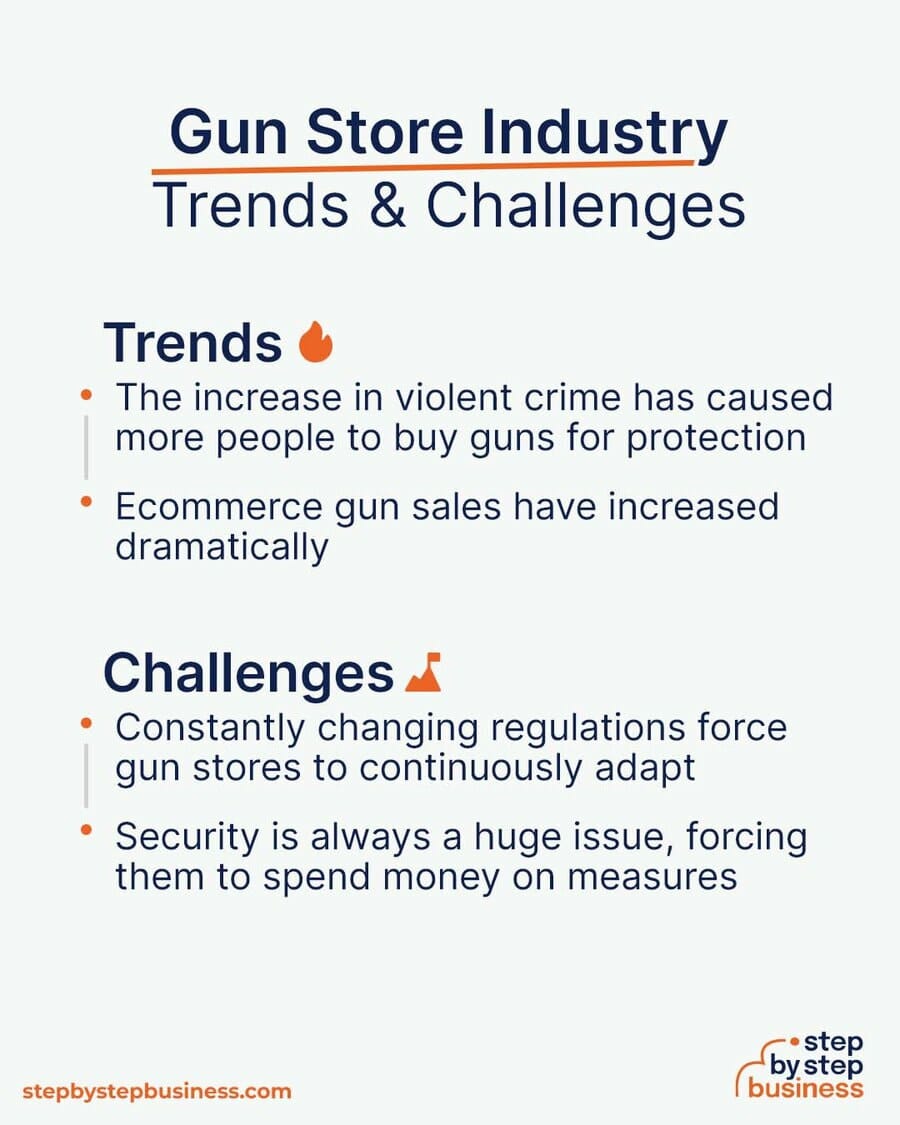
Trends
Challenges
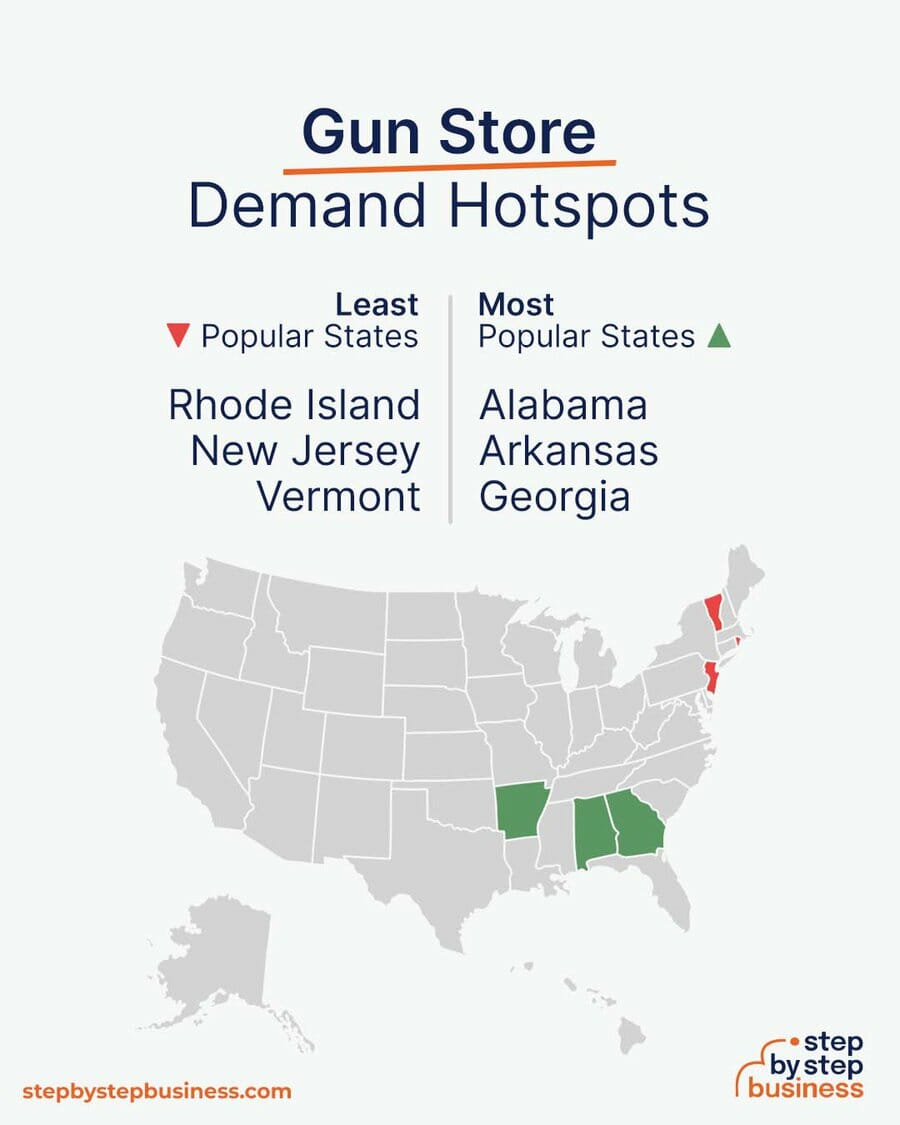
Startup costs for a gun store range from $45,000 to $75,000. The largest expense Is inventory.
| Start-up Costs | Ballpark Range | Average |
|---|---|---|
| Setting up a business name and corporation | $100 - $500 | $300 |
| Business licenses and permits | $3,000 - $5,000 | $4,000 |
| Insurance | $2,500 - $5,000 | $3,750 |
| Website | $500 - $1,000 | $750 |
| Inventory | $30,000 - $50,000 | $40,000 |
| Store space rental and preparation | $5,000 - $10,000 | $7,500 |
| Security features for the store | $3,000 - $5,000 | $4,000 |
| Sales and marketing budget | $500 - $1,000 | $750 |
| Total | $44,600 - $77,500 | $61,050 |
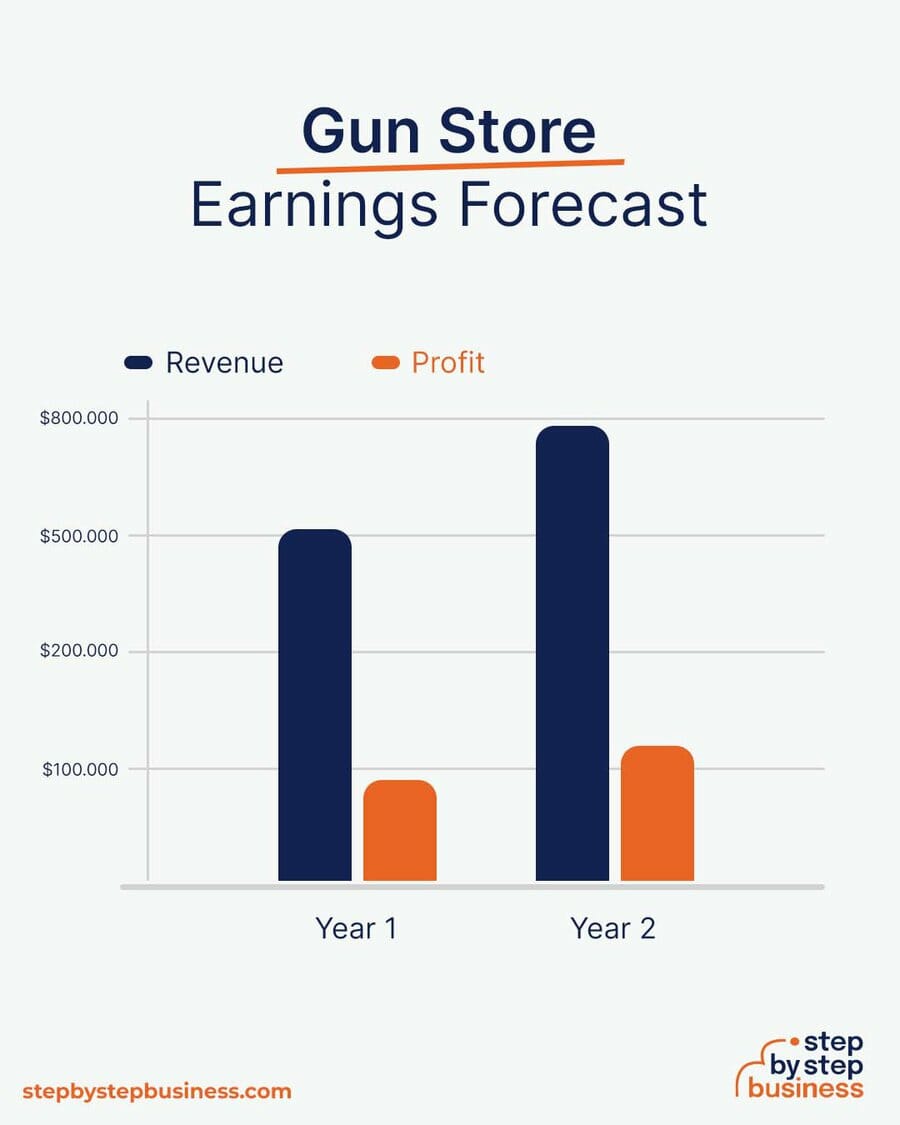
Prices for guns will vary, but these calculations will assume that your average customer will spend $500 when they come into your store. Your profit margin should be about 15%.
In your first year or two, you might make 20 sales per week, bringing in $520,000 in revenue. This would mean $78,000 in profit, assuming that 15% margin.
As you gain traction, sales could climb to 30 sales per week. With annual revenue of $780,000, you’d make a tidy profit of $117,000.
There are a few barriers to entry for a gun store. Your biggest challenges will be:

Now that you know what’s involved in starting a gun store, it’s a good idea to hone your concept in preparation to enter a competitive market.
Market research could give you the upper hand even if you’ve got the perfect product. Conducting robust market research is crucial, as it will help you better understand your customers, your competitors, and the broader business landscape.
Research gun stores in your area to examine their products, price points, and customer reviews.
This should identify areas where you can strengthen your business and gain a competitive edge to make better business decisions.
You’re looking for a market gap to fill. For instance, maybe the local market is missing a gun store that sells vintage guns, or one that offers gun safety lessons.
You might consider targeting a niche, such as hunting rifles.
This could jumpstart your word-of-mouth marketing and attract clients right away.
In addition to guns, of course you’ll want to sell ammunition, but you should also consider offering gun accessories, gun cases, and gun safes. You could also sell hunting licenses.
Your prices should be based on market prices in your area, but also on your costs to acquire the guns and other products.
Once you know your costs, use this Step By Step profit margin calculator to determine your mark-up and final price points. Remember, the prices you use at launch should be subject to change if warranted by the market.
People of all demographics buy guns, so you should market in a variety of places including Instagram and Facebook.
You’ll need to rent out a store space. You can find commercial space to rent in your area on sites such as Craigslist, Crexi, and Instant Offices.
When choosing a commercial space, you may want to follow these rules of thumb:

Here are some ideas for brainstorming your business name:
Once you’ve got a list of potential names, visit the website of the US Patent and Trademark Office to make sure they are available for registration and check the availability of related domain names using our Domain Name Search tool. Using “.com” or “.org” sharply increases credibility, so it’s best to focus on these.
Finally, make your choice among the names that pass this screening and go ahead and reserve your business name with your state, start the trademark registration process, and complete your domain registration and social media account creation.
Your business name is one of the key differentiators that sets your business apart. Once you pick a name, reserve it and start with the branding, it’s hard to switch to a new name. So be sure to carefully consider your choice before moving forward.
Here are the key components of a business plan:

If you’ve never created a business plan, it can be an intimidating task. You might consider hiring a business plan specialist to create a top-notch business plan for you.
Registering your business is an absolutely crucial step — it’s the prerequisite to paying taxes, raising capital, opening a bank account, and other guideposts on the road to getting a business up and running.
Plus, registration is exciting because it makes the entire process official. Once it’s complete, you’ll have your own business!
Your business location is important because it can affect taxes, legal requirements, and revenue. Most people will register their business in the state where they live, but if you are planning to expand, you might consider looking elsewhere, as some states could offer real advantages when it comes to gun stores.
If you’re willing to move, you could really maximize your business! Keep in mind, it’s relatively easy to transfer your business to another state.
Business entities come in several varieties, each with its pros and cons. The legal structure you choose for your gun store will shape your taxes, personal liability, and business registration requirements, so choose wisely.
Here are the main options:

We recommend that new business owners choose LLC as it offers liability protection and pass-through taxation while being simpler to form than a corporation. You can form an LLC in as little as five minutes using an online LLC formation service. They will check that your business name is available before filing, submit your articles of organization, and answer any questions you might have.
Choose Your State
The final step before you’re able to pay taxes is getting an Employer Identification Number, or EIN. You can file for your EIN online or by mail or fax: visit the IRS website to learn more. Keep in mind, if you’ve chosen to be a sole proprietorship you can simply use your social security number as your EIN.
Once you have your EIN, you’ll need to choose your tax year. Financially speaking, your business will operate in a calendar year (January–December) or a fiscal year, a 12-month period that can start in any month. This will determine your tax cycle, while your business structure will determine which taxes you’ll pay.
The IRS website also offers a tax-payers checklist, and taxes can be filed online.
It is important to consult an accountant or other professional to help you with your taxes to ensure you are completing them correctly.
Securing financing is your next step and there are plenty of ways to raise capital:

Bank and SBA loans are probably the best option, other than friends and family, for funding a gun store business. You might also try crowdfunding if you have an innovative concept.

If you’re considering opening a gun shop in the United States, several licenses and permits are typically required at the federal, state, and local levels. Requirements may vary based on your location and the specific nature of your business, but the following provides a general overview:
Always consult with a local attorney or appropriate state agency to ensure you have covered all the necessary licenses and permits. We recommend using MyCorporation’s Business License Compliance Package. They will research the exact forms you need for your business and state and provide them to ensure you’re fully compliant.
This is not a step to be taken lightly, as failing to comply with legal requirements can result in hefty penalties.
Remember that laws and regulations can change over time, so always make sure you’re up to date with current requirements.
Before you start making money, you’ll need a place to keep it, and that requires opening a bank account.
Keeping your business finances separate from your personal account makes it easy to file taxes and track your company’s income, so it’s worth doing even if you’re running your gun store business as a sole proprietorship. Opening a business bank account is quite simple, and similar to opening a personal one. Most major banks offer accounts tailored for businesses — just inquire at your preferred bank to learn about their rates and features.
Banks vary in terms of offerings, so it’s a good idea to examine your options and select the best plan for you. Once you choose your bank, bring in your EIN (or Social Security Number if you decide on a sole proprietorship), articles of incorporation, and other legal documents and open your new account.
Business insurance is an area that often gets overlooked yet it can be vital to your success as an entrepreneur. Insurance protects you from unexpected events that can have a devastating impact on your business.
Here are some types of insurance to consider:


As opening day nears, prepare for launch by reviewing and improving some key elements of your business.
Being an entrepreneur often means wearing many hats, from marketing to sales to accounting, which can be overwhelming. Fortunately, many websites and digital tools are available to help simplify many business tasks.
You may want to use industry-specific software, such as Rapid Gun Systems, or Orchid, to manage your inventory, compliance, and sales.
Website development is crucial because your site is your online presence and needs to convince prospective clients of your expertise and professionalism. You can create your own website using services like WordPress, Wix, or Squarespace. This route is very affordable, but figuring out how to build a website can be time-consuming. If you lack tech-savvy, you can hire a web designer or developer to create a custom website for your business.
Your customers are unlikely to find your website, however, unless you follow Search Engine Optimization (SEO) practices. SEO will help your website appear closer to the top in relevant search results, a crucial element for increasing sales.
Make sure that you optimize calls to action on your website. Experiment with text, color, size, and position of calls to action such as “Buy Now” or “Order”. This can sharply increase purchases.
Here are some powerful marketing strategies for your future business:

Unique selling propositions, or USPs, are the characteristics of a product or service that sets it apart from the competition. Customers today are inundated with buying options, so you’ll have a real advantage if they are able to quickly grasp how your gun store meets their needs or wishes. It’s wise to do all you can to ensure your USPs stand out on your website and in your marketing and promotional materials, stimulating buyer desire.
Global pizza chain Domino’s is renowned for its USP: “Hot pizza in 30 minutes or less, guaranteed.” Signature USPs for your gun store business could be:
You may not like to network or use personal connections for business gain. But your personal and professional networks likely offer considerable untapped business potential. Maybe that Facebook friend you met in college is now running a gun store business, or a LinkedIn contact of yours is connected to dozens of potential clients. Maybe your cousin or neighbor has been working in gun stores for years and can offer invaluable insight and industry connections.
The possibilities are endless, so it’s a good idea to review your personal and professional networks and reach out to those with possible links to or interest in gun stores. You’ll probably generate new customers or find companies with which you could establish a partnership.

As your business grows, you will likely need workers to fill various roles. Potential positions for gun store business include:
At some point, you may need to hire all of these positions or simply a few, depending on the size and needs of your business. You might also hire multiple workers for a single role or a single worker for multiple roles, again depending on need.
Free-of-charge methods to recruit employees include posting ads on popular platforms such as LinkedIn, Facebook, or Jobs.com. You might also consider a premium recruitment option, such as advertising on Indeed, Glassdoor, or ZipRecruiter. Further, if you have the resources, you could consider hiring a recruitment agency to help you find talent.

Gun stores are booming in spite of all the gun protests, so now could be the perfect time to start your own gun store. You’ll be serving a need in your community and making a nice profit in a $20 billion industry. You could even expand your store to new locations or add a shooting range to your store.
Now that you understand the business, you’re ready to fire up your successful gun store!

Published on November 4, 2022
The security services industry in the US is estimated to be worth $50 billion and expected to grow steadily in the next five years. Demand forsecuri ...
Read Now

Published on July 21, 2022
Military veterans have discipline, perform well under pressure, and are willing to make sacrifices, so it should come as no surprise that they often ...
Read Now

Published on July 14, 2022
Participating in a physical game of paintball and feeling the wind as you drive a go-kart offer a different kind of thrill compared to a video game. ...
Read Now
No thanks, I don't want to stay up to date on industry trends and news.
Comments